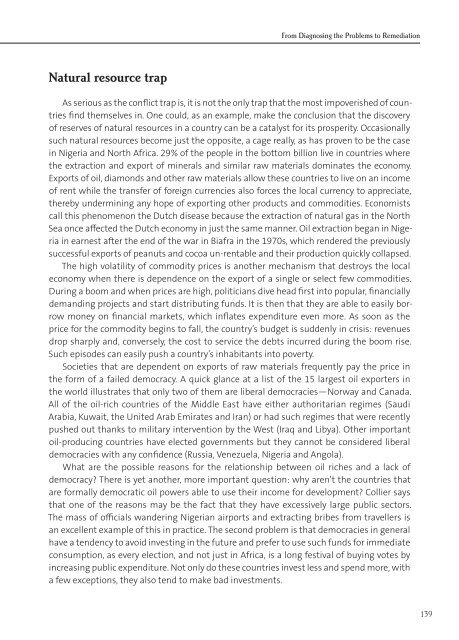Giant_and_Dwarf-FIN
Giant_and_Dwarf-FIN
Giant_and_Dwarf-FIN
You also want an ePaper? Increase the reach of your titles
YUMPU automatically turns print PDFs into web optimized ePapers that Google loves.
From Diagnosing the Problems to RemediationNatural resource trapAs serious as the conflict trap is, it is not the only trap that the most impoverished of countriesfind themselves in. One could, as an example, make the conclusion that the discoveryof reserves of natural resources in a country can be a catalyst for its prosperity. Occasionallysuch natural resources become just the opposite, a cage really, as has proven to be the casein Nigeria <strong>and</strong> North Africa. 29 % of the people in the bottom billion live in countries wherethe extraction <strong>and</strong> export of minerals <strong>and</strong> similar raw materials dominates the economy.Exports of oil, diamonds <strong>and</strong> other raw materials allow these countries to live on an incomeof rent while the transfer of foreign currencies also forces the local currency to appreciate,thereby undermining any hope of exporting other products <strong>and</strong> commodities. Economistscall this phenomenon the Dutch disease because the extraction of natural gas in the NorthSea once affected the Dutch economy in just the same manner. Oil extraction began in Nigeriain earnest after the end of the war in Biafra in the 1970s, which rendered the previouslysuccessful exports of peanuts <strong>and</strong> cocoa un-rentable <strong>and</strong> their production quickly collapsed.The high volatility of commodity prices is another mechanism that destroys the localeconomy when there is dependence on the export of a single or select few commodities.During a boom <strong>and</strong> when prices are high, politicians dive head first into popular, financiallydem<strong>and</strong>ing projects <strong>and</strong> start distributing funds. It is then that they are able to easily borrowmoney on financial markets, which inflates expenditure even more. As soon as theprice for the commodity begins to fall, the country’s budget is suddenly in crisis: revenuesdrop sharply <strong>and</strong>, conversely, the cost to service the debts incurred during the boom rise.Such episodes can easily push a country’s inhabitants into poverty.Societies that are dependent on exports of raw materials frequently pay the price inthe form of a failed democracy. A quick glance at a list of the 15 largest oil exporters inthe world illustrates that only two of them are liberal democracies—Norway <strong>and</strong> Canada.All of the oil-rich countries of the Middle East have either authoritarian regimes (SaudiArabia, Kuwait, the United Arab Emirates <strong>and</strong> Iran) or had such regimes that were recentlypushed out thanks to military intervention by the West (Iraq <strong>and</strong> Libya). Other importantoil-producing countries have elected governments but they cannot be considered liberaldemocracies with any confidence (Russia, Venezuela, Nigeria <strong>and</strong> Angola).What are the possible reasons for the relationship between oil riches <strong>and</strong> a lack ofdemocracy? There is yet another, more important question: why aren’t the countries thatare formally democratic oil powers able to use their income for development? Collier saysthat one of the reasons may be the fact that they have excessively large public sectors.The mass of officials w<strong>and</strong>ering Nigerian airports <strong>and</strong> extracting bribes from travellers isan excellent example of this in practice. The second problem is that democracies in generalhave a tendency to avoid investing in the future <strong>and</strong> prefer to use such funds for immediateconsumption, as every election, <strong>and</strong> not just in Africa, is a long festival of buying votes byincreasing public expenditure. Not only do these countries invest less <strong>and</strong> spend more, witha few exceptions, they also tend to make bad investments.139


